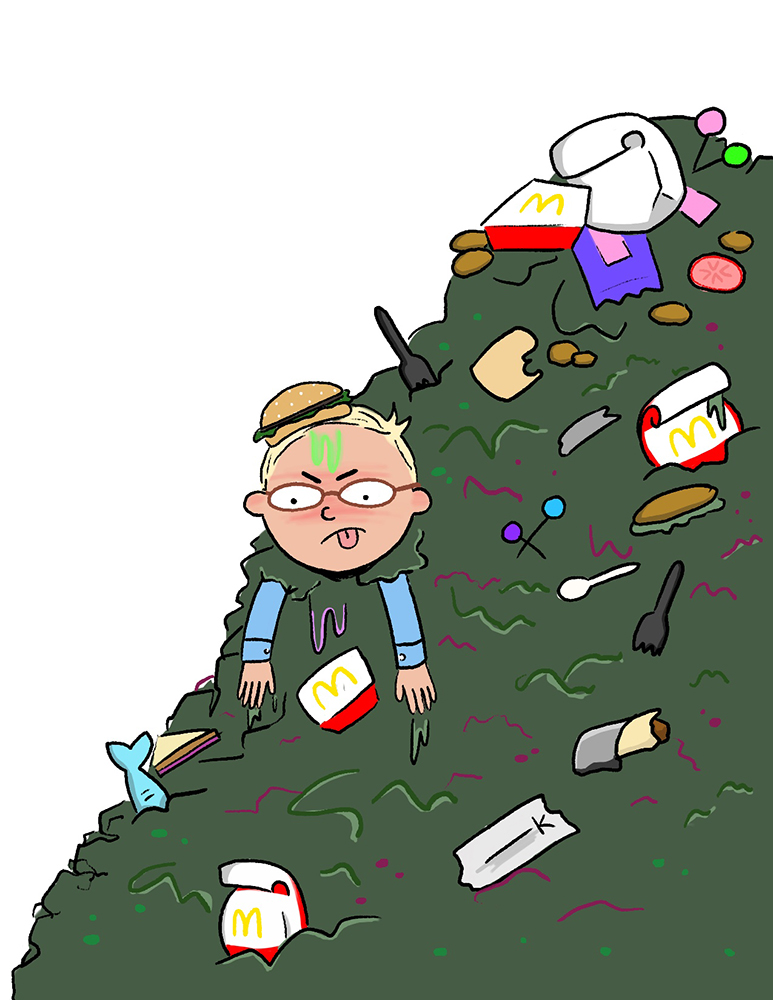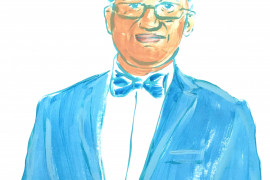In his article “The De-civilising Process,” Adrian Wooldridge, political editor for The Economist, deplores the “[c]ivilisational decline” and gives examples from his travels by train and by plane. His horror at the degradation of decorum is justified, but he fails to consider the conditions that have given rise to such a state of affairs.
Wooldridge avers that “today streets reek of urine and trains smell of fast food.” Streets smell of urine because of the homeless, who, having no homes, must make do in a society that makes it nearly impossible to use a bathroom without paying. Trains stink of fast food because those who Wooldridge calls the “underclass” keep the city humming, but are not accorded a living wage. This, in turn, necessitates long commutes and reliance on the cheapest sources of calories available, which, thanks to subsidies for nutrient-poor foods, means fast food and junk food. Thus unhealthy food is consumed en route to a job (possibly one of many jobs) held in order to subsist, not thrive. The sights and smells that so repulse Wooldridge reveal the discourtesy of those on the train, yes, but much more so the callousness of the most powerful who treat their labor force as expendable; in a feudal system, the aristocracy had to at least make the pretense of caring for the serfs. If one group of people are aware on some level that they are considered worthless, and if another group has the obverse awareness of its own (artificially) superior value under the present system, then how can we expect anything other than a nihilistic disregard for self and others?
Of the three crimes against decency that Wooldridge witnessed on flights, one was a man performing “a vigorous pushup routine in the corridor.” Our artificial environments are so movement-restrictive that this, while weird, speaks more to problems in design and outmoded notions of propriety than it does to rude behavior. Situations such as overnight flights, when a large number of people are crammed into what is effectively a cage with chairs and some video screens, call for innovation to allow for more movement. At various points in his article, Wooldridge makes plain his admiration for Enlightenment philosophy; although a basic four-day split was probably unknown to the likes of Kant and Spinoza, an active and healthy body permits a comparably healthy and active life of the mind and spirit.
In the fifth paragraph, Wooldridge singles out San Francisco as emblematic of societal decline: the city is “at the centre of the biggest creation of wealth on the planet, yet its streets are often littered with faeces, garbage and syringes.” Although his observation of that city’s street detritus is accurate, he ignores the ultimate cause: wealth created by the technology industry accrues to a small group, skewing the local and global economic systems in ways that cause the homelessness and poverty that Wooldridge only indirectly addresses by listing the refuse of such phenomena. San Francisco is a microcosm of wealth disparity between a small moneyed class and a large impoverished class. “[U]rbanisation, commerce and travel” have split society into two castes. A breakdown in civility in such a society is inevitable.

Illustrations by Bailey Granquist
In spite of the ongoing bifurcation of society into two classes that are largely invisible to one another, there are no prominent figures in the upper class demonstrating moral probity. In a previous era, perhaps one in which a hereditary aristocracy produced and safeguarded high culture, the religious leaders and public intellectuals would have at least made an effort to maintain decorum; there are no such figures now. The instances of discourtesy and incivility that Wooldridge enumerates are, therefore, examples of both personal failures and a grand societal failure. As despicable as it is for people to floss their teeth in their airplane seats or throw chicken bones in the aisle of an airplane (Wooldridge’s examples), and as unacceptable as it ought to be for people to talk loudly on the cell phone in a shared bathroom or play music from their phones while in line at the grocery store (some distasteful experiences of which I’ve been unwillingly made a part in the last few days), we cannot expect anything else when blowhards like Donald Trump and Boris Johnson engage in personal attacks (often in sophomoric terms) on journalists, judges, and politicians who they dislike.
I agree with Wooldridge that “the collapse of manners,” the descent to solipsistic chasing of sensory stimulation at all times with no regard for others, is troubling and portends only ill for the future of society. To fail to account for the societal conditions that cause the decline of civilization is to fail to properly diagnose and understand the problem. We—Wooldridge and I and the poor souls acting the fool on the train or in the men’s loo—need a sea change in cultural values: discourse instead of distraction; a search for truth instead of a search for constant sensory input; valuing the contributions of those in the humanities and arts (even contributions from those, such as Wooldridge and I, who respectfully disagree) over those in politics and technology who serve only their personal financial interests.
One way we can move toward this is to cease championing buffoons because of allegiance to incoherent party politics. People can, and should, disagree and argue, but there should never be room in public life for illiterate thugs wearing neckties. Leaders of government and business ought to be good orators, deep thinkers, and empathetic to the needs of those in their care, and in this way lead the culture itself out of the pattern of decline that Wooldridge, I, and so many others find frightening.





